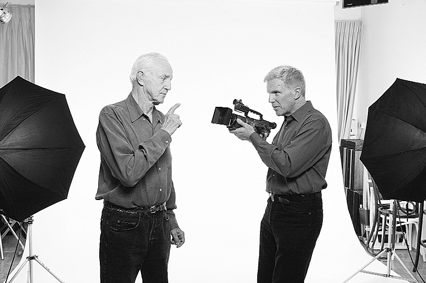A son challenges his filmmaker father—where else but on film
Films don’t get any more oedipal than “Tell Them Who You Are,” a documentary about director/cinematographer Haskell Wexler made by his son Mark.
Haskell is a pioneer of cinema vérité, although, aspiring to objectivity, he prefers the term “direct cinema.” Even his two fictional films, “Medium Cool” and “Latino,” include strong documentary elements.
Mark’s approach could hardly be more different. His film is a first-person account of his relationship with his father, in which he airs the family’s dirty laundry from a profoundly subjective point of view.
Haskell’s career spans more than 50 years, encompassing 19 documentaries and work as a cinematographer including Elia Kazan’s “America, America,” Mike Nichols’ “Who’s Afraid of Virginia Woolf?” and George Lucas’ “American Graffiti,” among other films. What comes off most strongly here, though, is a sense of the impact of the 1960s on its children. Although Haskell, now in his 80s, is too old to have been a baby boomer, the counterculture left its mark on him. His persistent radicalism seems principled and brave, but he expresses it abrasively, has trouble with intimacy and can’t relate to his own family without engaging in toxic, petty power struggles.
Mark tends to be a bit passive-aggressive, while Haskell is completely upfront about his anger. Politics have always been central to Haskell’s work. While Mark doesn’t spell out his own opinions, he’s far more conservative than his father. His expression of adolescent defiance was to embrace the government, while Haskell believed that the FBI convinced Milos Forman to fire him from “One Flew Over The Cuckoo’s Nest.” (Interviewed by Mark, Forman denied this.) Mark’s previous film was a made-for-TV documentary about Air Force One, and he proudly shows off photos taken with former American presidents.
“Tell Them Who You Are” includes a number of tense scenes that a more conventional documentary would have left on the cutting room floor. After attending an anti-war rally in San Francisco, Mark prepares to interview Haskell in his hotel room. He adjusts Haskell’s chair and fiddles with camera angles, trying to capture a beautiful sunset out the window. Wanting to talk about the protest, Haskell gets annoyed at Mark’s efforts to create a pretty image. Later on, Mark refuses to attend a political meeting because he’s afraid it will jeopardize his chances of getting on Air Force One again. Haskell eventually gets so frustrated that he films Mark filming him.
“Tell Them Who You Are” is most insightful when it shows how generational conflicts can play out politically. However, it’s full of undigested chunks of anger. Clearly, Mark made the film in an attempt to come to terms with his ambivalence towards Haskell. (His earlier documentary “Me and My Matchmaker” also dealt with his personal life.) It’s questionable whether he achieves any real catharsis.
The film abandons any pretense of a thorough biography after the first 10 minutes, as Mark runs down a list of memorable stories about Haskell’s career that he won’t be telling. The final few minutes, which include insightful quotes from Jane Fonda and Martin Sheen about the difficulties of family life, attempt to put a redemptive spin on the film, but it still reflects a great deal of sheer nastiness from both Mark and Haskell. Mark attempts to show Haskell in a kinder light by depicting him visiting his ailing ex-wife, now suffering from Alzheimer’s disease and confined to a nursing home, but this scene feels too bluntly designed as an emotional peak.
Still, Haskell’s perception that “Tell Them Who You Are” will be an unflattering portrait comes true. (He initially refuses to sign a release form, finally doing so during the closing credits.) While Mark deserves credit for treating his subject critically––this is the antithesis of cookie-cutter DVD-bonus documentaries––and even showing himself acting like a jerk, he doesn’t have much to say about Haskell beyond a bitter cry and a few token gestures towards reconciliation. Even though one member of this dysfunctional family may be famous, its problems are all too common.
gaycitynews.com


































